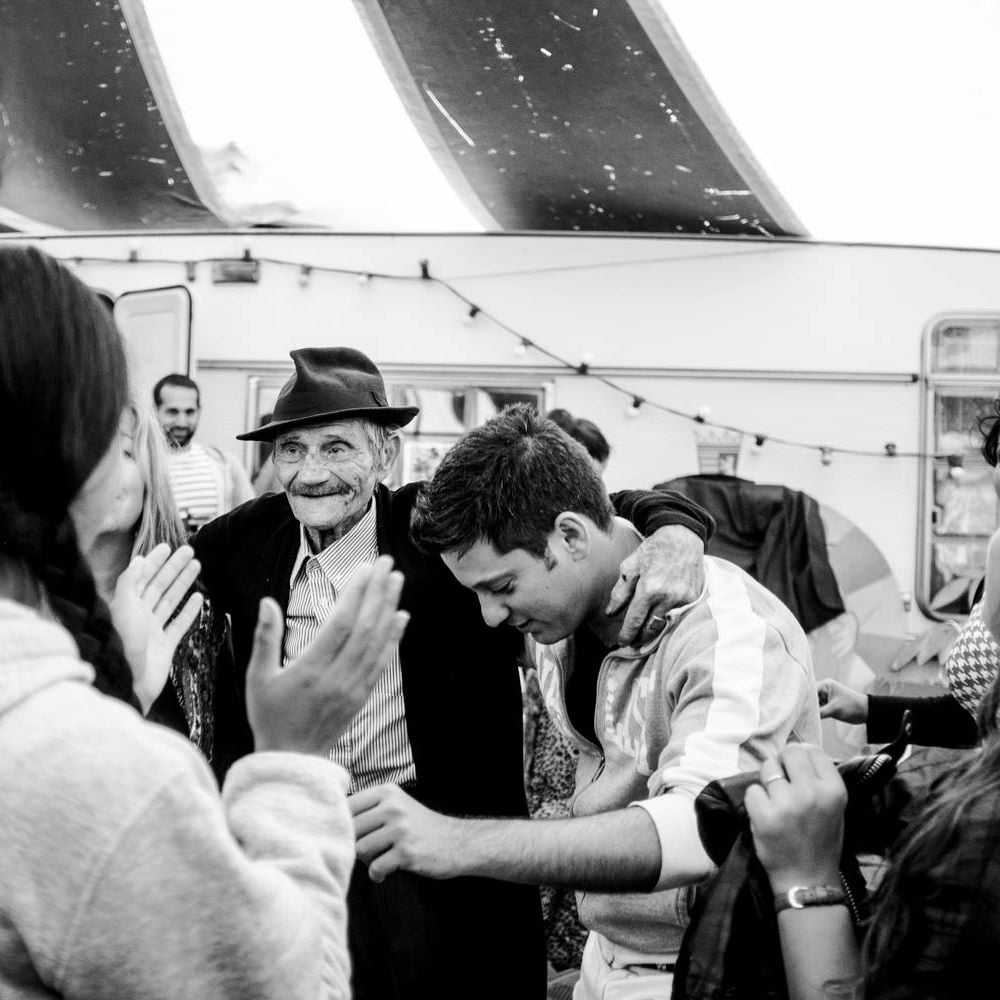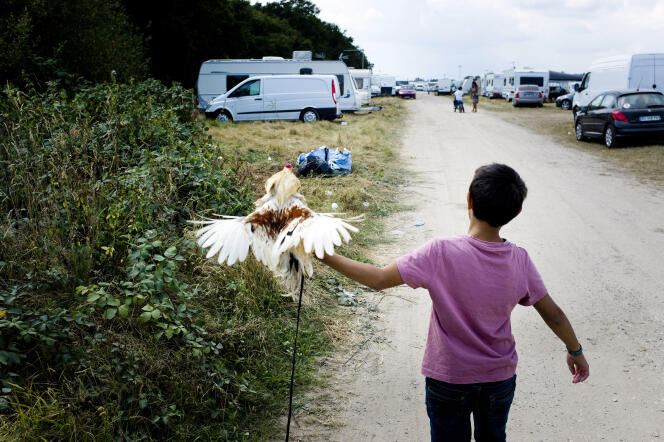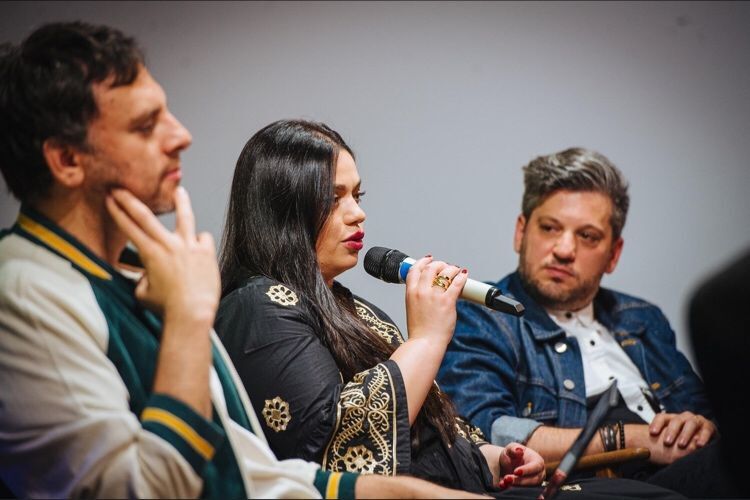To be the Voice of Romanis
Pierre Chopinaud is a French writer and the initiator of the La voix des Rroms (the Voices of Romanis) NGO, a human rights advocate, a pro-Roma activist and an independent expert. He works with political contexts, literature, and arts. In his books, he writes on Romani topics and recounts Romani stories of emigration, discrimination, basing his texts on his own experience and reflections, and on the experience of those whom he encountered in his life.
Gajo with a French passport
This French writer was born in France, in one of the Paris’s suburbs. His Mum hailed from the South of Italy. Born in a large farmer’s family, she emigrated to France in the 1950s, in search of a better life. Pierre’s father is a classical Frenchman. And, as the author himself stresses, out of his several identities, his core identity is French.
— This is the language I use to write books. I am, first and foremost, a French writer — says Pierre. At the same time, he claims that his French identity is a reverberation of what hides inside himself. His direct way of addressing people and matters and his joy and ability to live in a community is something Pierre inherited from his mother. Because the community is something very special for him. Something related to family. Something important. The everyday life, culture, customs and traditions of the rural Southern Italy is something that alludes to the Romani traditions: same openness towards the world, towards others, towards yourself. The vitality and joy of life above everything else. Long family conversations at a large table, the importance of preservation of traditions, everyday life, folk lore, and one’s own history. And telling the stories of others.
— For Romanis, I am and will always be a Gajo. But at the same time, there is something from this culture that is shaping me. And something that continues being part of myself. Something hidden somewhere deep inside in my identity.
.jpg)
The War in the Balkans and the first encounter with Romanis
When Pierre was 18 years old, in the mid-2000s, he decided to become a volunteer and set off to the Balkans where the war was going on. He wanted to work and help ethnic minorities that have suffered from military activities. For a certain period of time, he lived in a refugee camp. It was there that he got familiar with the Romani community—which was the one that encountered the hardships of war more than other civilians. It was then that Pierre started learning the Romani language as he communicated with local communities in the refugee camp, and then became a translator of Romani language. Acquaintance with Armand Gatti, a French-Italian journalist and playwright, urged the then-young writer to create successful stories about Romanis in literature. Chopinaud published texts about political intervention for the cause of emancipation of displaced minorities. His first magnum opus, Enfant de perdition (The Child of Perdition), is a novel wherein he describes the hard life of Romani migrants, their stigmatisation in society, and the search for their own way towards themselves.
— The meeting with Romanis in Kosovo was full of sentiment. Ever since, this topic became part of my life. At the same time, they (the Romanis) perceived me as a foreigner, a Westerner. Of course, I was a stranger to them. I was indeed a Gajo. Even if and even though I spoke Romani.
Acquaintance with Romanis in the war context of the Balkans has left an imprint upon his entire life—and then this story has materialised in the form of a French belles-lettres literature. The pain, the fear, the despair, the sadness, and the injuries of war—and, at the same time, the will to live and the incredible joy of being together.

Photo: left, wearing a hat: Raymond Gurême, a French Romani (Manouche), a survivor of concentration camps in France and a fighter in the French resistance; right: Chopinaud
The Romani Resistance
Pierre Chopinaud is one of the initiators of establishing 16th of May as the Romani Resistance Day. The heroic and tragic date in the history of Romani nation is related to the events of the Second World War in Nazi Germany. The process of introducing this date, so important for Europe, was not a simple one. It began with grassroots, local initiatives. Next went work in scientific and historical archives. The importance of personal stories of those who have survived the tragedy of the Holocaust during the Second World War. The uninterrupted collaboration with NGOs, activists, historians, academic researchers. Pierre recalls the team of ARKA, an Organisation for the Advocacy of Romani culture, and Natali Tomenko, a Romani activist, as he mentions those who was then involved in the process of lobbying for this date in the context of international diplomacy.
— This day is, first and foremost, about heroism. These are the stories of those who resisted in Auschwitz-Birkenau Death Camp. And, at the same time, these are stories about those wounds that never heal.

Photo: «The Child of Perdition» («Enfant de perdition») – an illustration to the interview of Pierre Chopinaud for the French Le monde newspaper
Not to Talk on Behalf of Someone Else
As far as working on Romani topic is concerned, the writer explains that, in this discourse, it is extremely important to tell someone’s story but to not talk on someone’s behalf. To allow those communities to decide for themselves how to organise their everyday life and how to establish social and culturological relations. To be together with the community and not to smother it. This is the only way in which we can avoid the over-exoticisation of Romanis—which is something we can observe and encounter in the mass media and information environment. Pierre opines that the exoticisation of this group of people takes place when there is not enough knowledge and understanding of deeper and wider strata of this culture and people.
— In my books, I write about more political and culturological aspects of this group of people. I try to explain the complicated processes which, in our opinion, may seem to be too simple for us at the first glance. This is not the literature for the masses, so my readers are somewhat prepared to perceive this topic: they are either interested in it or are researching it on a more scientific level. In this way, we manage to avoid exoticisation, work with more awareness, relay and broadcast the important message about those who are close.

Photo (left to right): Janusz Panchenko, ethnographer; Natali Tomenko, Deputy Director of ARСA Youth NGO, Pierre Chopinaud
See also
- AURA: платформа для самоорганізації і захисту прав ромської спільноти за кордоном
- Ромські активісти – про новорічні та різдвяні традиції
- Репортажистка Єва Райська: «Через звичайні людські історії я хотіла показати глибші процеси».
- Новий центр підтримки ромів у Сумах: хто отримає шанс на освіту
- Письменниця Тімея Шрек: «Життя так склалося, що повертаюся до коренів».
- Танцівниця Вікторія Чорна: «Саме ромський танок допомагає людям просто вижити»
- Громадські активісти і дослідники — про ромську мову, перспективи розвитку та загрози
- Лінгвіст Михайло Ослон: «За свої мови носіям зазвичай доводиться боротися самотужки».
- Музикант Віллі Пап-молодший: «Американський джаз або ромський джаз...»
- Художник Тиберій Йонаш: «У моїх планах відкрити величезний центр у ромській громаді»